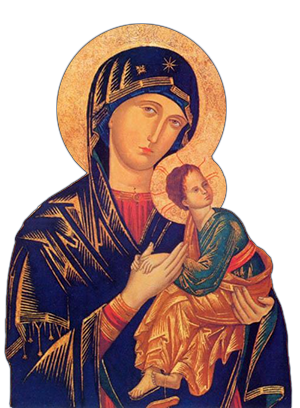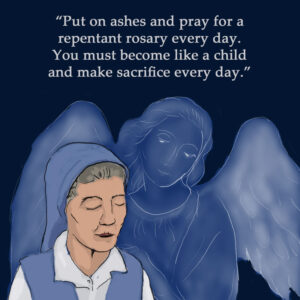Father Mitch Pacwa's homily for Wednesday, November 11
Appropriate for our present moment in history is this reading from Titus. It’s worth keeping in mind that when St. Paul says to remind everyone to be under the control of the magistrates and authorities, to be obedient, and to be open to every good enterprise, he said this while the Roman government had arrested him–this is something that he wrote from prison. You might think that he would be very resentful but apparently he was not. And we have this sense throughout his writings in Romans, before he was in jail, and here and elsewhere and afterwards, shows that he still understands that there is an order in society that is bigger than his own personal needs–it went beyond him. And he also understood very clearly that he was suffering for Christ, and that, in his case, the problem was false accusation.
He had been accused–in fact while he was in jail–of bringing a Gentile into the courtyard of the temple. He had not. But that accusation was made. People did not even want him to go to trial–they did not–they wanted to kill him. There were a number of folks in Jerusalem who had sworn an oath to kill him that they would not eat or drink until they killed him before trial.
And St. Paul, being a Roman citizen, which is a very specific status at this time, not everybody was allowed to be a citizen; you had to be born in Rome. And then after a nasty war called the Social War, in Italy, at the end of the 2nd century BC, they extended citizenship to everybody in Italy, but very reluctantly; the Romans and fought and still lost and had to give that. Then, just before 200 AD, they gave citizenship to everybody in the Empire.
But at the time of St. Paul, citizenship something very important, it had a lot of privileges as a Roman citizen. And something specific for him is that if he were to be executed he had the privilege of being beheaded rather than being crucified; only slaves and subject people (were crucified). He understood the way his government worked, he knew his rights and he trusted that if he came to trial he would be dealt with reasonably. He understood also that he was in jail not because of a persecution by the government (yet), but it was because of the wicked people. Although we seem to know, he eventually got out of jail until the persecution of Nero. And then he and Peter were both killed. But again it would’ve been something similar.
Nero was a very wicked leader. He killed his mother. He killed his one of his wives and a number of his friends. And ran the government into the ground. And was all about himself. He was an egomaniac. So when that corruption to protect himself he blamed Christians for the fire of Rome and persecuted them, but that was contrary to the principles of the government.
In the midst of all of that kind of turmoil, that really affects Paul’s life, he still has a trust in government.
There is something about that, it’s very important to understand about ancient Romans. They knew how easy it was for a political leader to be corrupt. In their own history, they began as a monarchy, they had kings. And they saw the king’s becoming increasingly corrupt. So they deposed the kingship and started a Republic. And under that Republic, the key thing for them was to divide the power of the king into a lots of other offices. So there were councils who ran things in terms of administration, judges, lower officials; all sorts of people, and even a big change was that no longer was the king the high priest in charge of all religion; they separated that out, all of that was made distinct.
Why? It is because they understood by painful experience, human beings are sinners. The Romans had no concept of the doctrine of original sin, but they saw everybody around them living it out.
You don’t need to have the doctrine to experience the sinfulness of everybody else. And your neighbors might even point out your own sinfulness as well because this is a universal reality. And we make ourselves foolish to forget our sinfulness, our selfishness our desire for control and power and our pride. We make a huge mistake to forget about that in ourselves. And equally big mistake if we do not think that everybody around us is the same. We all have to deal with that sinfulness. And the role of government–this is been Paul’s teaching back in Romans as well is here–that you need folks in government to be able to keep the peace because there is so readily and urge by human beings to live out their original sin and try to take over.
Go ahead and let a 2-year-old have a tantrum and then do whatever they demand when they are having a tantrum. See how much peace that brings into your family. It won’t happen, will it? And there are a lot of 2-year-olds who have the bodies of 50 and 60 and 70 and 80-year-olds that still try to get their way with tantrums. And the role of government is to keep a certain balance so that they do not get out of control.
That’s why it is an extremely dangerous situation that is showing up in some of our cities today. That the defunding of police has led to, in Minneapolis, a 22% increase in crime over last year. This is not a good thing. And it ends up being especially problematic for the poor sections of the population. The poor folks suffer quite a bit in the chaos. And it’s not because we think that everybody who belongs to the various police departments and governmental departments are themselves perfect and sinless. No. They need checks and balances as much as the rest of us do. The only people they called to be policeman are sinners. And, of course, the only people who feel the call to be criminals are sinners too. But they are more out of control.
There is that sense that we have to overcome a certain idealism that becomes destructive. Because it is trying to live out an idea of what people ought to be rather than deal with concrete people as they are. This is key.
As a matter of fact, I would assert this, looking back in history, all of the most oppressive governments that we have seen, especially in the 20th century, have been based on abstract ideals. It’s very important to see why people are attracted to such notions–they love the ideals.
“This would be wonderful!” As one politician said, a world to which the police are defunded would be like living in the suburbs everywhere. Try that. In Minneapolis today, and many other cities as well–my own hometown of Chicago–try that, it’s nonsense.
The ideal sounds wonderful but it forgets to look at real people. And letting governments be totally in charge is the same false kind of ideal. You can’t put the criminals in charge of the streets or politicians totally in charge of our lives, not because we’re better than they are, but we are all in the same boat of original sin, that we are in the same boat of needing to have checks and balances on the sinfulness of each other. That is what we can do on a human level.
But then St. Paul, and by the way, he says here as he is calling his readers to slander no one. There’s a big need for that today, is there not? This is something that is a real problem that we have. Not just in the political realm, but throughout; magazines and newspapers, committed to passing on the gossip of other people’s sins. Why would anybody read such things? Why is that your business? If you know of somebody who is doing the things that they are writing about in these magazines, send them to confession; that’s what they need! Then I can’t talk about it. That is where we go. But the idea of bantering around various people sins–this is wrong. He tells everybody to be peaceable and considerate, gracious towards everyone. That is what he says, but we ourselves were once foolish, that is the other part of this. He doesn’t say you were foolish.
St. Paul knows this reality of original sin, he taught it clearly in Romans 5; that all of us have fallen short of the glory of God, in Romans 3. This is the reality. He said, “we ourselves were once foolish, disobedient, deluded slaves to various desires and pleasures, living in malice and envy, hateful ourselves and hating everyone else,” which itself is a tremendous insight.
The people who hate other folks so thoroughly, always check back on what they hate. The hatred that they express, check on that, and see whether or not that is what they themselves are doing. Because, often times, the most vociferous people who express hate the most loudly are actually expressing that it is a self-hatred they project on to other people.
I think Sigmund Freud was a little nutty and in a lot of his theories, but his understanding of human defense mechanisms was very spot on. There were a lot of things that he did observe very carefully. And the role of defense mechanism, by which I take what is I hate about myself and projected onto the people around me, this is what St. Paul is describing so well here: hating everybody else but being hateful ourselves.
And watch, as anyone who works in law enforcement knows, one of the groups that hate thievery are other thieves. If a thief gets robbed, they will get revenge. I’ve known plenty in my days, and they get really angry when somebody steals from them. And the antidote will ultimately not just be the human effort to keep a balance of power like the Romans tried to do when they built their government, the Republic. The ultimate antidote is going to be the kindness and generous love of God, our savior.
The only thing new that enters into the human dynamic is the grace of God. That is what he says through the bath of rebirth and renewal by the Holy Spirit he has ritually poured out righteous deeds because of his mercy.
St. Martin had been a soldier. He gave it up and gave half of his cloak to a poor beggar that was freezing. And then went on to become a monk and give up all of his possessions, and serve the poor. He is one of the Patron Saints of the destitute and those who serve the poor. And as a bishop, which he took on reluctantly, he was known for making sure that those in need were cared for, up until the idealistic government of the French Revolution, pursuing liberty and fraternity and equality, until they came and destroyed his monastery, took it apart, shut it down, desecrated it. In their idealism, they destroyed folks who were actually doing the good–a good example of what I meant by the ideals being so destructive.
Martin lived out that grace that Christ worked in him after his conversion and that this is poured out to us through Jesus Christ; this is our antidote. And we as Catholics have to stand in this world that would very much continue a merciless hatefulness, and we will be those who administer that mercy and graciousness of Christ so that we can become the heirs of eternal life.



